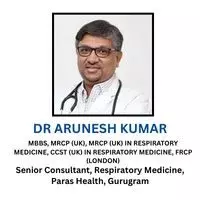New Delhi: As Delhi battles worsening air quality yet again, medical experts are warning of serious health risks due to the combined impact of extreme heat and dust-laden air. With the capital consistently ranking among the world’s most polluted cities, the situation has grown increasingly hazardous.
During last year’s peak smog season, Delhi's AQI hit a staggering 494 on November 18—among the highest since 2015. This year, heatwaves are compounding the crisis.
Doctors at Paras Health caution that the dangerous mix of high temperatures and fine particulate matter (PM2.5 and PM10) is triggering a spike in respiratory ailments. While asthma and COPD patients remain most vulnerable, even healthy individuals are reporting dry cough, throat irritation, fatigue, and sleep disturbances.

Dr Arunesh Kumar, Senior Consultant, Respiratory Medicine, Paras Health, Gurugram, noted, “The combination of extreme heat and air pollution is putting a massive strain on respiratory health in Delhi-NCR. High temperatures increase airway inflammation, while fine dust particles penetrate deep into the lungs. We are seeing a surge in patients complaining of breathlessness, wheezing, and increased dependency on inhalers—even among those with previously stable conditions.”
Doctors are raising concerns over the growing impact of toxic air and high temperatures on respiratory health. Early signs of distress include chest tightness, shortness of breath, excess mucus, and increased use of inhalers in asthma patients. Even those without pre-existing conditions are experiencing throat dryness, headaches, skin irritation, and fatigue.
Severe symptoms such as confusion, dizziness, or bluish lips and fingertips may indicate dangerously low oxygen levels and require urgent medical attention.
To stay safe, doctors advise limiting outdoor exposure during peak heat and pollution hours, particularly between 12 pm and 4 pm. When going outside is unavoidable, wearing N95 or equivalent masks can help reduce inhalation of harmful particles.
At home, the use of air purifiers, especially in bedrooms, can significantly improve indoor air quality. Staying well-hydrated supports respiratory function, while showering and changing clothes after being outdoors can help remove pollutants from the skin and clothing.
People are also advised to avoid indoor irritants such as incense, cigarette smoke, and dust accumulation. Regularly checking the Air Quality Index (AQI) can help individuals plan their day and reduce exposure on days with poor air quality.
For those with chronic respiratory illnesses, doctors stress the importance of following prescribed treatment plans, keeping rescue inhalers readily available, and seeking timely medical care if symptoms worsen.
Delhi's struggle with air pollution is no longer seasonal. As the city faces ongoing threats from rising temperatures and hazardous air, taking preventive measures is essential to protect public health.



